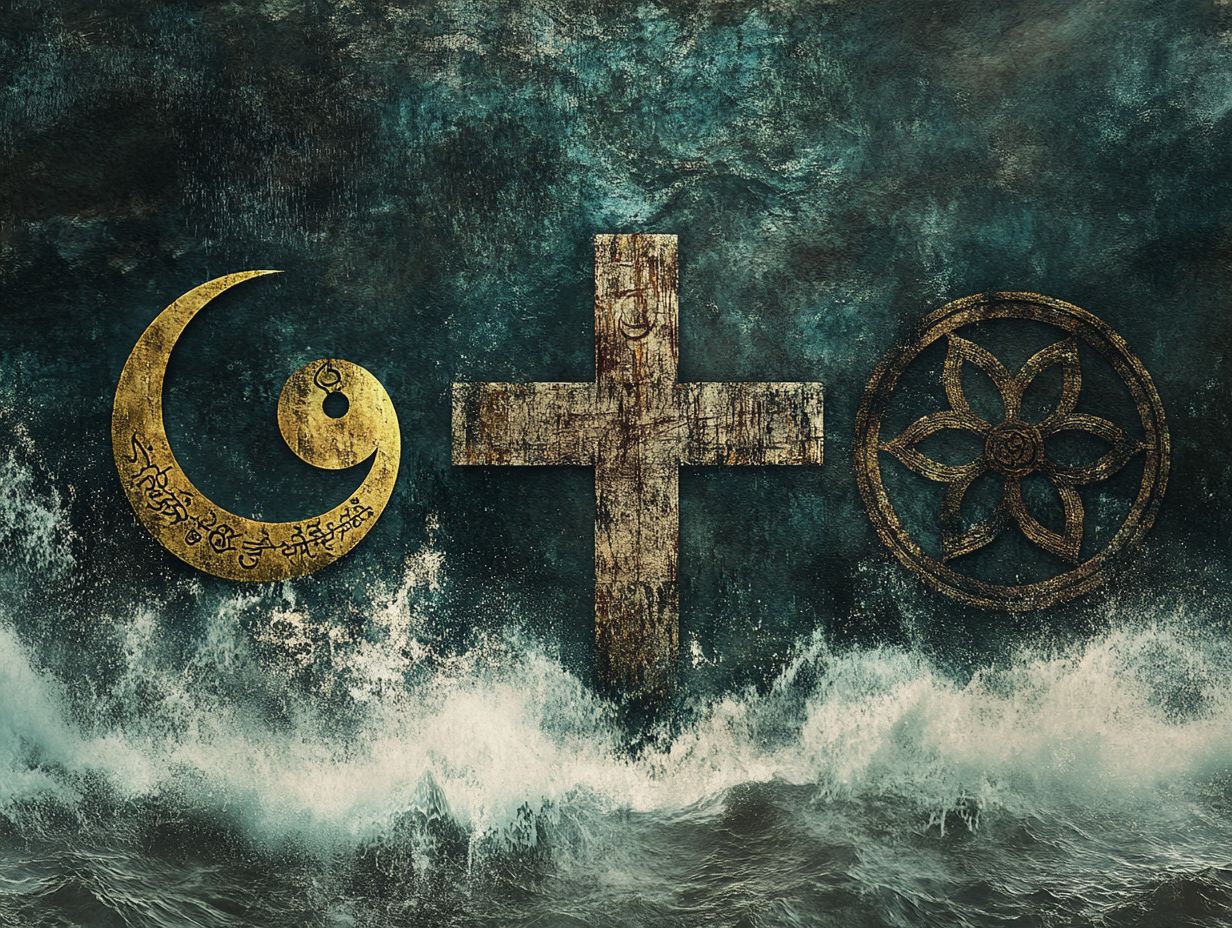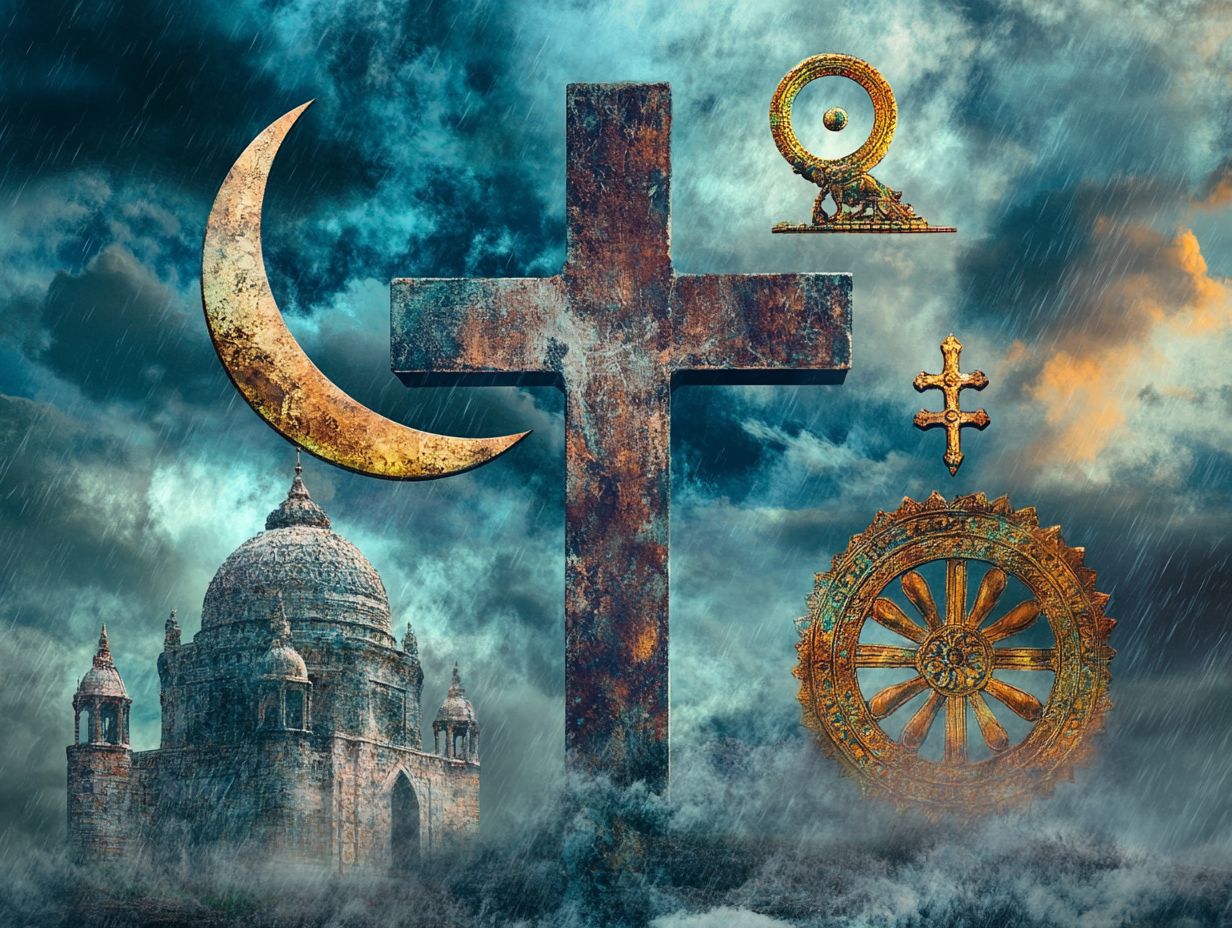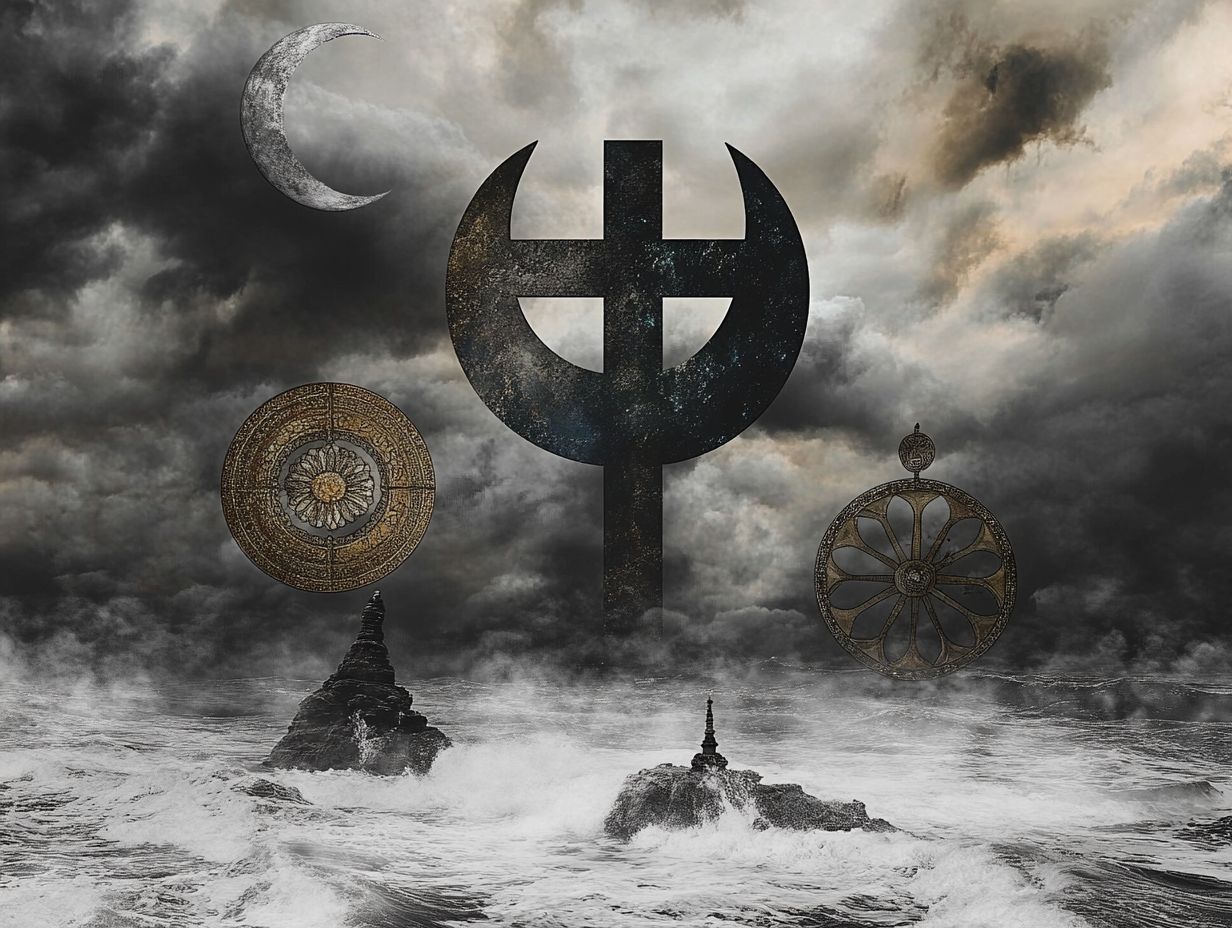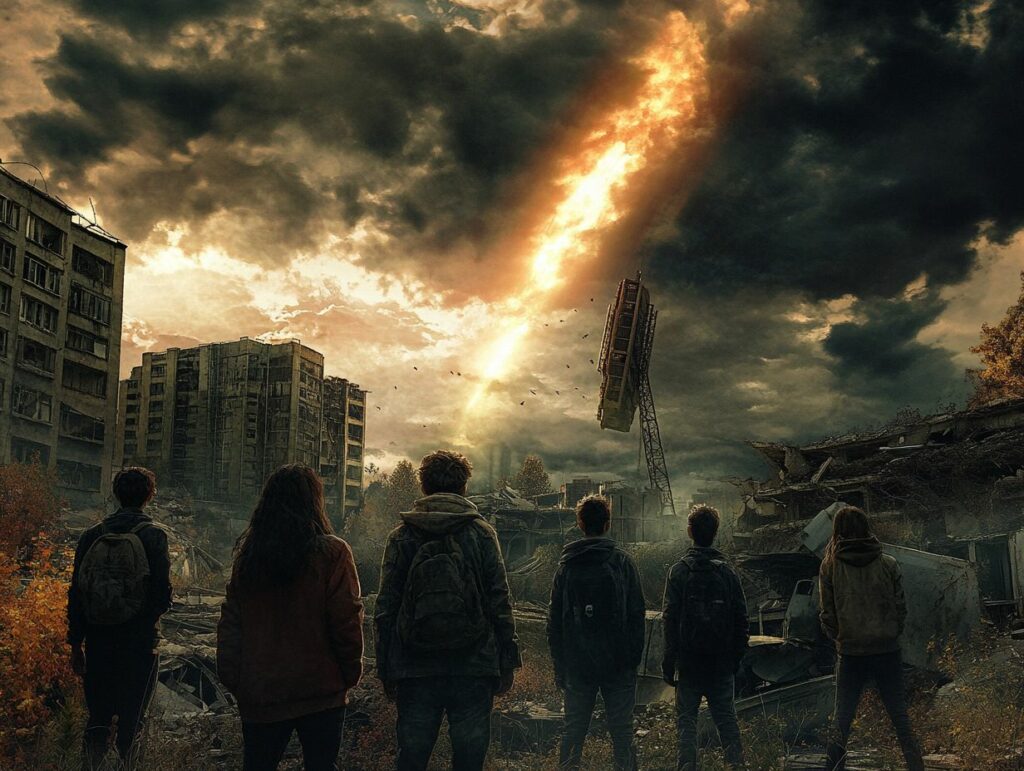Doomsday has captivated the human imagination for centuries, symbolizing ultimate judgment and transformation across various cultures and religions.
This exploration delves into the diverse interpretations of Doomsday, examining major prophecies from Christianity, Islam, Judaism, Hinduism, and Buddhism.
Additionally, it discusses the beliefs and practices that emerge in anticipation of these apocalyptic events, including how communities prepare for and respond to them, as well as the profound role faith plays in concepts of salvation.
Join us in unraveling the complexities of Doomsday beliefs and their enduring relevance in today’s world.
What is Doomsday?

Doomsday, often referred to as the Apocalypse or End Times, encompasses a range of beliefs and interpretations regarding the end of the world and humanity’s ultimate fate.
Various religious and philosophical traditions hold eschatological beliefs or theories that articulate expectations surrounding judgment and divine intervention, frequently associated with prophetic literature, including sacred texts from Christianity, Islam, and other faiths.
The cultural and theological significance of Doomsday is reflected in how communities respond to signs of the end, divine judgment, and the accompanying hope or fear.
Religious Prophecies of Doomsday
Religious prophecies of Doomsday encompass events such as Judgment Day, the Second Coming of Christ, and various signs of the end, as described in different scriptures and sacred texts across various faith traditions.
These prophetic narratives function as both warnings and sources of hope for believers who seek salvation in a world plagued by suffering and sin.
Major Doomsday Prophecies
Major Doomsday prophecies encompass a wide range of predictions and narratives that describe what the end of the world may look like, including divine judgment and the climactic struggle known as Armageddon.
These prophecies originate from apocalyptic literature, a genre of religious texts that claims to reveal hidden knowledge and truths about the end times. This body of literature often grapples with themes of good versus evil and the moral culpability of humanity as we approach the end of the world.
The rich tapestry of these predictions, deeply rooted in religious texts and folklore, reflects a broad spectrum of cultural beliefs and societal anxieties. For example, interpretations of the impending Apocalypse vary significantly; some view it as a literal event marked by catastrophic changes, while others see it as a metaphorical awakening to a new spiritual order.
As communities confront their fears and hopes about the future, the concept of divine judgment serves as a powerful reminder of the need for reflection and ethical behavior. The imagery associated with Armageddon captivates the imagination across various cultures, influencing art, literature, and even popular media, thereby solidifying its place in the global consciousness.
Interpretations of Doomsday in Different Religions

The interpretations of Doomsday differ significantly among various religious traditions, each providing unique cosmologies and eschatological visions that reflect their beliefs, values, and historical contexts.
Christianity emphasizes the Second Coming, while Islam focuses on the Day of Judgment. In contrast, Hinduism presents a cyclical cosmology, and Buddhism offers its own teachings on the subject.
These diverse perspectives influence how communities perceive the end of the world, concepts of salvation, and the afterlife.
Christianity
In Christianity, the concept of Doomsday is primarily associated with the Second Coming of Christ, during which believers anticipate a final judgment that will result in either eternal salvation or eternal condemnation. This idea is often articulated through the Rapture and events described in the Book of Revelation.
This theological framework emphasizes the hope of salvation and the transformative power of faith in the face of the trials of the end times. As followers prepare for this significant event, they often find solace in the teachings of scripture, which outline the signs that herald the coming of the Lord.
The Rapture, an event in which faithful believers are said to be taken up to meet Christ in the air, symbolizes the promise of deliverance from a world fraught with tribulation. Many Christians believe that this divine intervention not only marks the end of an age but also serves as a profound reminder of God’s love and mercy.
By nurturing their relationship with God and embracing the principles of faith, believers can navigate their lives with hope, confident in the assurance of their salvation as they await the fulfillment of biblical prophecies.
Islam
In Islam, the Day of Judgment is the penultimate event in Islamic eschatology, during which individuals will be judged for their actions. According to the Quran and Hadith, there are significant signs that will precede this event. Muslim beliefs emphasize the roles of prophetic figures and divine interventions that prepare humanity for the ultimate reality of the afterlife.
The Day of Judgment is heralded by a series of signs, including the arrival and emergence of the Mahdi, a prophetic figure who will guide people back to the path of righteousness. Along with prophecies related to the appearance of Dajjal, the Antichrist, and the second coming of Jesus, these events are viewed as important indicators that the world is moving toward Judgment.
The faithful are encouraged to remain steadfast in their beliefs and seek forgiveness, as these messages instill a sense of urgency, prompting moral reflection and ethical correction to prepare individuals for the inevitable end that awaits all souls.
Judaism

Judaism’s beliefs about Doomsday are closely linked to messianic expectations and the eventual restoration of the world. These beliefs emphasize the ethical implications of righteous living as preparation for the afterlife.
The concept of the Messianic Age envisions a future marked by peace and divine presence, deeply rooted in the sacred history of the Jewish people. This vision compels adherents to focus on their moral actions and behaviors, as each individual’s choices contribute to a collective reality.
Ethical living is not only a personal responsibility but also a communal endeavor that can hasten the arrival of the Messiah. In this context, the afterlife gains new significance as a continuation of one’s earthly journey, where one’s deeds resonate into eternity.
Consequently, discussions about Doomsday in Judaism are inseparably tied to the ongoing pursuit of justice, compassion, and the hope for a harmonious world aligned with divine will.
Hinduism
Hinduism presents a unique perspective on Doomsday, rooted in its cosmological understanding that time is cyclical. In this view, the end of one cycle marks the beginning of another. This belief in divine involvement during times of turmoil reflects a faith in the restoration of dharma and the eventual return of the divine in various forms.
According to Hindu philosophy, each cycle, known as a yuga, consists of four stages: Satya, Treta, Dvapara, and Kali. As the Kali age progresses, characterized by moral decay and spiritual decline, believers hold that the divine will return to assist humanity.
This cyclical view of time suggests that destruction is not the end; rather, it is a necessary precursor for renewal and rebirth. Divine incarnations, often referred to as avatars, re-establish balance and guide followers back to righteous living, highlighting the ongoing interplay between chaos and restoration within the cosmic order.
Buddhism
Buddhism’s perspective on Doomsday does not signify an end to existence; rather, it emphasizes an awareness of suffering and the importance of following a path toward enlightenment and spiritual growth that enables us to transcend our temporal reality.
The existential questions and thoughts raised by the concept of Doomsday parallel those that the Buddha urged individuals to contemplate: Who are we? What is our purpose? What happens after we die? How do we find meaning in our lives? What obstacles do we encounter on our spiritual journeys?
Doctrinally, Buddhists do not embrace a notion of Doomsday. Instead of a cataclysmic end, Buddhist teachings focus on recognizing the impermanence of our world and the inevitability of suffering. This understanding directs us toward seeking peace and wisdom within ourselves, compelling us to confront our deepest fears and desires.
By turning to the Buddha’s teachings on compassion, mindfulness, and impermanence, the spiritual path becomes clearer, allowing us to perceive the interconnectedness of all beings. In this way, Buddhists are encouraged to engage with these existential questions and concepts, transforming the pursuit of enlightenment into an essential aspect of our existence rather than merely a means to avoid an end.
Beliefs and Practices Surrounding Doomsday

Doomsday beliefs and practices play a significant role within faith communities. Rituals and spiritual exercises associated with these beliefs are designed to prepare followers for the hardships anticipated during Doomsday.
These rituals and spiritual practices reflect deeper theological principles and cultural narratives linked to Doomsday beliefs, often intertwining spirituality with communal identity and ethical accountability.
Preparation and Response to Doomsday
Preparation and response to the idea of Doomsday manifest in various forms, ranging from organized movements like Doomsday cults to personal spiritual practices aimed at confronting fears and fostering resilience in the face of perceived global catastrophe. These responses often encompass themes of spiritual warfare and moral accountability, highlighting the complex relationship between belief and action.
Communities worldwide employ a variety of strategies to cope with the looming prospect of Doomsday, whether through collective gatherings that strengthen their bonds or through individual practices that encourage self-reflection and give the power toment.
Doomsday cults may create a sense of urgency and belonging by invoking strong narratives that motivate members to prepare for an imminent crisis. In contrast, individual spiritual practices often emphasize mindfulness, meditation, and the cultivation of inner strength, enabling people to effectively manage their anxieties.
These responses represent a rich tapestry of human experience, as diverse global perspectives shape the ways individuals engage in spiritual warfare, seeking not only to survive but also to thrive during uncertain times.
The Role of Faith and Salvation
Faith plays a significant role in the context of Doomsday, as many individuals seek salvation and spiritual awakening through their beliefs and practices. They perceive divine intervention as a means of transcending and resisting the suffering and sin present in the world. The interplay between faith and hope serves to strengthen both individual and community resolve.
In times of uncertainty and fear, believers often turn to their spiritual texts and community leaders for guidance and reassurance. This support typically manifests in teachings and promises that speak of redemption and a brighter future.
The quest for salvation is expressed not only through individual beliefs but also through collective actions and shared experiences, often taking the form of rituals and prayers that seek the mercy of the divine. The journey toward salvation is rarely a solitary one; individuals share their experiences of spiritual awakening and encourage one another to embody the virtues espoused by their faith. Through this search for salvation, connections and bonds among individuals are strengthened.
As the world moves closer to the concept of Doomsday, many seek salvation through their faith. Prayer and community become vital avenues for sharing hopes and fears, as well as providing mutual support and encouragement. In this way, faith becomes an essential component of the journey toward resilience and hope amidst the myriad challenges that threaten the world.


